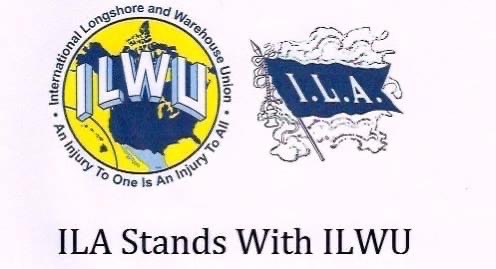NORTH BERGEN, NJ – (October 14, 2025) This week the Governor of California, Gavin Newsom, vetoed a bipartisan bill that would have restricted ocean carriers and terminal operators from using public funds for the purchase of automated equipment. The Senate Bill (SB 34) enjoyed strong support from California Republicans and Democrats and passed in the State’s house and senate. The ILA regards this as a direct attack by Gov. Newsome on Organized Labor and especially, the members of the International Longshore and Warehouse Union (ILWU) and ILA.
The International Longshoremen’s Association issued the following statement regarding Gov. Newsome’s vicious attack on Longshore Workers and in support of the ILWU:
“This week should have been of celebration for our brothers and sisters of the International Longshore and Warehouse Union (ILWU); a victory for American workers who move the goods that power this country. Instead, it’s another gut punch. Governor Gavin Newsom has vetoed Senate Bill 34 (SB 34), a bill that would have protected middle class port jobs, ensured responsible use of taxpayer funds, and set a national example for how technology can be managed without displacing workers.
By rejecting SB 34, the Governor has chosen the side of foreign ocean carriers and corporate lobbyists over the working men and women who keep California’s ports, and America’s economy, running. This veto isn’t just a political decision; it’s a betrayal of the very people who built the ports that made California a global trade hub.
SB 34 was a rational, balanced, bipartisan bill. It passed with strong Democratic and Republican support in California because it stood for something simple: protecting jobs and using taxpayer money responsibly. The legislation would have prohibited public funds from being used to automate jobs away. The bill made clear that taxpayer money should not be used to “require, incentivize, encourage, or otherwise promote the use of automated, remotely controlled, or remotely operated equipment.” In other words, if terminal operators want to automate, they must use their own private capital, not public subsidies, to do it. That’s not anti-innovation; that’s common sense.
It also stopped harmful regulatory overreach. SB 34 blocked the South Coast Air Quality Management District (SCAQMD) from imposing arbitrary “cargo caps” or operational limits at the Ports of Los Angeles and Long Beach until 2031. Such measures would have strangled California’s supply chain, jeopardized port jobs, and driven cargo and revenue to less-regulated states.
SB 34 wasn’t about rolling back climate goals or resisting change. It was about responsible modernization, ensuring that technological progress doesn’t trample the working class or undermine America’s economic backbone.
Governor Newsom’s veto of SB 34 is more than disappointing – it’s revealing. In the weeks leading up to his decision, The Politico reported that West Coast employers hired one of the Governor’s close personal friends as a lobbyist to influence his office. The timing couldn’t be clearer: corporate interests fought hard to kill this bill, and they succeeded.
Let’s call it what it is, a sellout. The Governor has sided with global shipping conglomerates, many of which are foreign owned, over American dockworkers who live, pay taxes, and raise families in the very communities his decision hurts. These companies aren’t struggling mom-and-pop operations. They’re multibillion-dollar giants that made record profits during the pandemic profits off the backs of the men and women who risked their health to keep the supply chain moving.
When a state uses taxpayer money to subsidize automation that replaces human labor, it’s not innovation, it’s corporate welfare. And when an elected official enables that process, it’s not leadership, it’s capitulation.
For longshore workers, this bill represented something much larger than regulatory reform. It was a model for the nation proof that we can balance progress and fairness, technology and humanity, climate responsibility and economic justice. That’s right, choosing people over profits. People over job killing technologies.
SB 34 would have protected middle class jobs and the communities that depend on them. It ensured transparency and accountability in how environmental policies are implemented. And it sent a clear message that California’s prosperity must not come at the expense of its workers.
Instead, by vetoing this bill, Governor Newsom sent a dangerous signal that political influence and corporate lobbying carry more weight than working families. This veto undermines not only the ILWU but every American worker fighting to stay relevant in an economy increasingly dominated by automation and artificial intelligence.
Just last week, a New York Post article warned that artificial intelligence could eliminate over 100 million jobs within a decade. That’s not science fiction. That’s the real trajectory of our economy if left unchecked.
Technology should assist human beings, not replace them. Yet the pattern is unmistakable: corporations invest in automation not to improve safety or efficiency, but to cut labor costs and maximize profits. Whether it’s self-driving trucks, automated cranes, or automated yard equipment, the story is always the same fewer jobs, less accountability, and more corporate control.
That’s why International Longshoremen’s Association President Harold J. Daggett has spearheaded the upcoming Global Anti-Automation Conference in Lisbon, Portugal next month. This historic event will bring together dockworkers and union leaders from around the world to address the existential threat of automation. Because this isn’t just an American challenge, it’s a global fight for the soul of the working class.
Job-killing technologies must be regulated, not celebrated. Workers must be part of the conversation and not casualties of it.
Governor Newsom had a chance to stand with the workers who have kept California’s economy alive through war, recession, pandemics, and supply chain crises. Instead, he sided with billion-dollar corporations that view labor as a line item and people as disposable. His veto wasn’t inevitable; it was intentional. And history will remember it that way.
SB 34 may be dead for now, but the movement behind it is not. The ILWU and the International Longshoremen’s Association will continue to fight for legislation that protects jobs, regulates automation, and ensures that working-class people are not sacrificed in the name of “progress.”
For nearly a century, longshore workers have powered the growth of this nation’s trade and economy. We’ve adapted to change before, from the introduction of containerization to the evolution of modern logistics. But one thing we will never adapt to is being erased by machines while politicians look the other way.
California had the opportunity to lead the nation in proving that progress and people can coexist. Instead, the Governor chose profit over principle. But this story isn’t over, because the dockworkers of America and the world are not done fighting.
In the end, SB 34 was never just about ports. It was about priorities, and whether we value human work or corporate greed. The Governor made his choice. Now, it’s up to us to make ours.”


